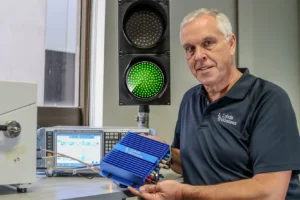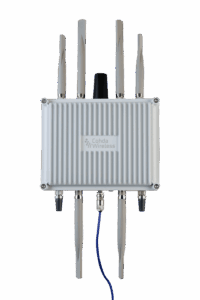Connected vehicle technology company Cohda Wireless has been invited by BAE Systems Maritime Australia to trial its proprietary positioning technology as part of an initiative to make its Osborne Naval Shipyard in South Australia a safer environment for thousands of shipbuilding workers.
BAE Systems Maritime Australia is responsible for the design and build of nine Hunter class frigates for the Royal Australian Navy (RAN). The Hunter Class Frigate Program (HCFP) is the largest surface ship project in the Australia’s defence history creating thousands of jobs and establishing continuous naval shipbuilding capability in Australia.
Cohda’s proximity threat detection platform uses sensors to prevent collisions between moving vehicles, equipment and employees, leveraging its proprietary Locate technology, which was developed to solve the vehicle positioning accuracy challenges inherent in the urban canyons of cities where large buildings, underground carparks and tunnels interfere with GNSS (GPS) signals. It is now being trialled with the view that it could be deployed to deliver sub-metre accurate 3D location in a complex shipyard environment.
The first phase of trials will begin later this year and is part of BAE Systems Maritime Australia’s progressive Digital Safety Innovation Challenge being conducted at the Pilot Line Zero Research and Testing Facility in the Tonsley Innovation District in Adelaide, South Australia.
Cohda was initially invited to apply its proprietary positioning technology to support BAE Systems Maritime Australia’s naval shipbuilding activities in April 2021. This initial testing phase focused on logistics ‘track and trace’ technologies and is in its final stages.
During this pilot deployment, Cohda Wireless successfully installed and commissioned a positioning system to locate tagged assets with hardware, software and firmware at the Pilot Line Zero Facility. The results obtained for positioning a tag showing sub-meter positioning performance at 95th percentile. Such performance proves that the proposed solution is well suited for the purpose of asset tracking in the shipyard environment, and any like environment.
Cohda Wireless chief executive Paul Gray said he was delighted to be extending the work his company was doing at Pilot Line Zero.
“Cohda Wireless is a leader in connected vehicle technology and through pioneering projects like this one, we are proving that our Locate technology can be applied to just about any environment where people and vehicles share common operating space,” he said.
(Picture – Cohda Wireless – left to right John Galvin, Head of SHE at BAE Systems Australia, Paul Gray, CEO Cohda Wireless and Sharon Wilson – the Australian Capability Director, Hunter Class Frigate Program, for BAE Systems Australia.)























